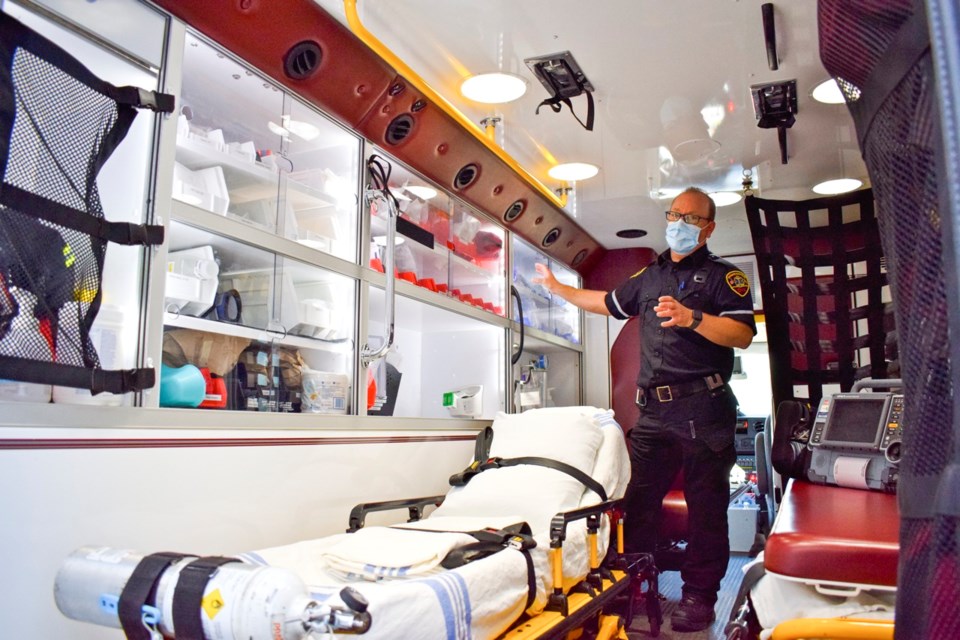ESTEVAN - The COVID-19 pandemic brought endless challenges for every industry across the world. And while a lot of the processes and operations were disrupted or reshaped by the global emergency, it also resulted in some positive and helpful changes.
Estevan EMS experienced all types of shifts first-hand. While they had to readjust many of their procedures and protocols to ensure patients' and their own safety, they also were one of the first ones to join a new program, aimed at training paramedics in providing palliative care to patients at their homes.
Gene Stephany, operations supervisor with the Estevan EMS, said that they've been providing palliative care to residents for about a year now, and it's been working really well.
"It kind of started during COVID time. There was a lot of dark clouds but one of the silver linings that we found was getting involved with the palliative care program," Stephany shared. "Most of the health authority paramedic services are trying to get to this point, and we were some of the lucky ones who got in on the first grouping of this course."
Estevan EMS had all their staff certified in Learning Essentials and Approaches to Palliative and End of Life Care (LEAP), which is a palliative care program for healthcare professionals used across Canada. Estevan paramedics went through several modules of training and then worked with Regina palliative care specialists, who shared their experience and directed the EMS members as to what they needed for equipment, medications, protocols, etc.
Once that was in the books, Estevan paramedics were able to respond to this type of calls for service in a new way.
"If we go on calls and we identify a patient as needing to contact palliative care services, we can refer them back and then get them into that program. [And with patients needing palliative care] we go to their house, and sometimes when home care or palliative care is not available, we'll access and manage their pain, manage their symptoms, a lot of it involves helping support the family,” said Stephany.
“It's a difficult time for everyone, it is difficult for the patient, but it's also a difficult time for the family and everybody else involved. So we're involved in that, trying to answer all their questions," Stephany explained, adding that oftentimes people feel more comfortable asking difficult questions when they are in their own homes.
Before the change, when paramedics would go to a home knowing that a patient was a part of the palliative care program, they had to take them to the hospital. Due to their condition, palliative care patients much rather would be in their own homes, but EMS couldn't provide the needed care.
"Our reaction two years ago was to put them on the stretcher, take them down to the hospital, have them treated at the hospital, and then an hour or two later load them back up again and run them back to their house," Stephany said.
"It was upsetting for the patient and the family. Where now we can just contract that treatment right in their own home. So, there's no disturbance to the atmosphere in the home and the support systems and the comfort everybody's got there. We can just treat them, answer any questions they have, and at the same time, save all that hassle and save a spot in the emergency to where the patient would have been taken for that."
Stephany noted that palliative care fits with what they do and feels just like a natural extension of their jobs. And the local paramedics enjoyed that extension, he said.
"Honestly, it's really so satisfying. Before you'd go and you knew the patient needed treatment that you weren't allowed to give them. So you would take them into the hospital, and you knew they were being disrupted, even though you're doing the best thing you can for the patients, you knew that this was disrupting their comfort level, and they didn't really want to go, but it had to be done.
“Where now there's a real feeling of accomplishment when you can go in there and help somebody out, and still maintain that level of comfort, that level of dignity … It's just better for everyone. And our guys are really happy with it, for sure," Stephany said. Besides the palliative care services they provide to the community, once a month Estevan EMS staff goes to local palliative care to join other specialists, working together to get the best for the patients.
"It's a collaboration with all the different services involved. There are pharmacists, nurses, palliative care, physicians are there, paramedics are there. We all talk about the cases and then make decisions about who's able to take care of what and then advise the family of the easiest way to get a hold of the resources they need," Stephany explained.
After training was done, it started off fairly slow, as the service was new and Stephany assumed that a lot of people were worried that there will be a lot of noise in the neighbourhood if an ambulance shows up in front of a house. But he noted that these calls are done in a very different manner.
"There's a special way. The patient or their family will call into our dispatch centre, and our dispatch centre will tell us that this is a palliative care call. So we do it very discreetly, and a lot quieter than most people are used to seeing us run around town."
Now that more people know that the Estevan EMS can provide palliative services and know more about how it's done, the number of calls went up. And Stephany said that they are glad to provide all the help they can to the community.






